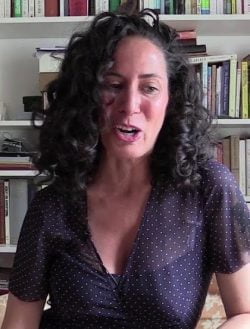#869 Canadian short stories 2019
Best Canadian Stories 2019
by Caroline Adderson (editor)
Windsor, Ontario: Biblioasis, 2019
$22.95 / 9781771963275
Reviewed by Marion Quednau
*
 Reading the stories in this anthology reminded me of something the late American writer, Jim Harrison, once said: “But a man can stop his car, get out: he can dive in a lake and swim across, and then climb a tree. So don’t tell me you can’t change your fiction.” He was urging writers toward courage, taking some risks, creating characters begging for some hard knocks and comeuppance. Self-recognition at a cost.
Reading the stories in this anthology reminded me of something the late American writer, Jim Harrison, once said: “But a man can stop his car, get out: he can dive in a lake and swim across, and then climb a tree. So don’t tell me you can’t change your fiction.” He was urging writers toward courage, taking some risks, creating characters begging for some hard knocks and comeuppance. Self-recognition at a cost.
The short fiction collected from advanced reading copies or magazines in 2019 by editor Caroline Adderson would meet Harrison’s criteria: there’s always something to be gained — and more to be lost. I found it interesting that two-thirds of the stories were from the point of view of youth or childhood. Children are nothing if not great risk-takers and mistake-makers; they can dream up almost anything as recompense for loss or abandonment, and we’re bound to get onside. I mean, we were all children once. And some of the so-called grown-ups in these accounts still long for the vivid sensations of “youth,” and might take drugs to get there, as in Frankie Barnet’s story. “Except we hadn’t taken enough, so we only got to thirteen or so, bitter and angry…in different rooms, blasting loud music.”

If Adderson warns us in the intro that we’re at risk of despair in divisive times, she hadn’t yet imagined the pandemic — which proves that we can be endangered even at a dinner party schmoozing with friends before the bad news comes that we should have kept apart. So even without crossing Harrison’s lake or clambering that tree, we take our chances with the unexpected. These stories remind us we can be in harm’s way in a school band trip, as in Shashi Bhat’s account of betrayal: “She points … and mouths the words school shooter. But Eunice has already unpacked her flute … and is trilling away.” Or a kid might be at risk with a perfectionist mom hanging her hopes on his disaffected brilliance at age 11: “Martin, his mother says, Do as I tell you…. He slumps further in the passenger seat. The future, he thinks glumly, is as far away as the past. And then it is not — Martin’s mother lifts her hands from the wheel and jerks her head toward him. Listen to me, she snaps, and the car strays into the left lane.”

I actually felt the swerve in Elise Levine’s account of mother and child not connecting. Or you could end up at an artist’s colony in the desert where no one else shows, feeling duped, and thereby all the more vulnerable to the heat of invitation and transformation, as Kai Conradi describes it: “It must be the way she looks at you; a total ambivalence that makes you want, more than anything, for her to care about you.”
There’s more than one consideration of art as a coping mechanism: “My professor put his hand on my back and smiled at me in the sly, gentle way that reaffirmed my belief in my own poetry.” We wonder in Barnet’s depiction whether this is grown-up love, or even love. Or even art. In the Cathy Stonehouse story a boy is asked by his mother, “What are you drawing?” while he’s thinking of “…long, silvery cylinders like bullets which left metallic traces in his pockets. He’d heard that graphite was poisonous, which was exciting. The taste had been cold; bloody. Perhaps if he licked it long enough he would die.”

Children are conduits that send us dispatches from the margins. Largely powerless — and in the passenger seat — they are exacting witnesses. In Lisa Moore’s affecting story, moments of power and the pain of not being in the driver’s seat keep trading places. “We came to the … blind curve, and I asked her if it was clear. I told her I couldn’t see. She was looking out the passenger window, avid, silent. Then she told me it was safe to go.”
In short fiction you don’t need a big event; the form lends itself to the small detail or nuanced epiphany, what Richard Ford calls “how you say the things you don’t have language for.” Like the young eight-year-old in Richard Van Camp’s tale “on the kemooch” for love: “she gives me a big sweaty upper lip, okay?” It’s an aspect Jade Colbert, Globe & Mail reviewer, once called “the line that sings.” It’s not just a frill, but the beauty of language by what it conveys, a resonance. “Mothers and sons are telepathic…,” says Moore, “it’s wordless — paradoxically instant, layered and piercing. It shoots through.” Or how about the sing-song in Zsuzsi Gartner’s romp of plants having sweet revenge, “so many of us strung out … Miracle-Gro our crystal meth,” “some of us virtually all vulva and vagina, penis and glans — when we had to passively endure the ministrations of the butterflies (all la-di-da).”

These stories give us curses and ghosts, near-misses and actual mess-ups with cars, and there is plenty of unlikely intersection and contagion. How about a savage human bite (to the throat) or a good old-fashioned lick from a dog that might give you, if not exactly cooties, then … “commensalism.” There are twists in plot, but sometimes you just know: “Mom wasn’t making supper as she always did…. She was reading a magazine,… She told us Dad had dressed in his suit and tie for work … like he always did…. She sipped her tea and ate a cookie. It was a Pim’s, a biscuit from France with orange jam filling.” The subtlety of Christy Ann Conlin’s scene is a vivid depiction of how children can feel a change in the air, a dread.

There are plenty of mistakes made … failed photographs or lies, failed music or nerve, failed pranks with a shopping cart or failed road trips with dad. There are harmless-seeming water balloons sent to shrieking targets with unforeseeable consequence, there are terrible, dreaded hotel stairs climbed and there is a garage rooftop, with twins, briefly (one of them topples). But never mind what actually occurs in these stories — children are bound to fall, after all. As British author, Hilary Mantel, recently said of novel-writing, “it’s the feeling you’re left with as a reader, not what happens, that matters.” In a short story even more so. “My mother…leaned forward and peered into the icebox, swallowing hard… ‘Great,’ she whispered. ‘Are you going to be traumatized by this?’…. I felt like the right answer was no, so I shook my head.” The brief denial in Zalika Reid-Benta’s story leads to all sorts of reinvention in order to make the girl’s fear viable.

Short fiction is a great way to pay attention, really notice small intricacies. You notice how time expands and contracts, how it flattens in the desert or might hang suspended in a high-end condo: “At home Martin continues to feed the cats. He cleans their litter. He plays with them in the first-floor bathroom after school and on weekends. Hello kitties, he says. He tells them his best fart jokes. Each time he leaves, he closes the door carefully so the cats won’t escape. Bye for now, kiddos, he says.” And we see time circle in a rhythm of “three ceremonies” for a “young warrior,” the child’s questioning and repetition of hopeful tasks in order to win his love, only making it more hilarious. In Troy Sebastian’s rendering of “a long time ago” in Ktunaxa, you might be “somewhere between the first glacier winter and the first Hockey Night in Canada,” in cahoots with the spirit, Kupi, bringing back a belief in miracles “since the white man showed up on teevee, …[when] Alex Trebek shakes your hand.”

The short story form demands a good ending, as pivotal as it is open-ended, as in Mireille Silcoff’s protagonist finding herself far from home, “knotty wood walls with so many black eyes…would connect with mine, and it would not mean that I was in a good place, but rather that I was somewhere.” Even a small revelation can take the entire story to elicit, develop, or disprove. As Richard Ford says in his recent brill collection, Sorry for your Trouble, “the needle is the haystack.” You find out what’s precious almost by default, by “small adjustments,” everything else falling away.
This sensation of paring down to essentials is certainly true of our current addled sense of time and belonging in pandemic terms of doldrums with a splash of panic. If Adderson invited us to a dinner party as intro to this book, a sampling of “pickled herring next to the pavlova,” that’s all been nixed. Now, any real intimacy or revelation has become a story about once-familiar gatherings with touted yarn-spinners — has become longing, nostalgia for all those dinners run slightly amok (there was always that one guest!).

Time has become oddly short or disparately long, loose, and endlessly looping, all our actions deemed reckless or careful: we have only the spare length of a short story to be swayed, taken aback, nicely shocked or amused, informed by anecdote or someone’s voice. At first we’re seated the way the hostess, Adderson, has set things up, to juxtapose a few people, mix it up, take us out of our familiar territories. And then we find ourselves switching chairs, might even end up at the kids’ table where we can misbehave, or lingering over a conversation with a too-old-for-his-years child, and somehow know we will remain friends with that grieving mother long after the first impression we had of her laughing.
The best part is that we can just crash this virtual party and go buy the book. Take the plunge — enter the choppy waters and incoming waves of pandemic time. And that doesn’t mean when life is slo-pokey, but when experience is profound and rocks our world, alters everything we once assumed. When we need to literally “curl up with a book,” get some respite, need to recall there have been other shocks and losses and people have come out more resilient and more acutely aware, grateful for any strange scrap of beauty or love coming their way.
*

Marion Quednau is a fiction writer and poet living on the Sunshine Coast. Her short story, “Sunday Drive to Gun Club Road” was short-listed for the Carter V. Cooper Short Fiction Award in 2019 and will appear in the CVC9 anthology. She has a collection of short fiction forthcoming when publishers regain some traction in trying times. Editor’s note: Marion Quednau’s book Paradise, Later Years (Caitlin Press, 2018) was reviewed by Renée Sarojini Saklikar in The Ormsby Review no. 648 (November 4, 2019). Marion herself has recently reviewed Dunk Tank, by Kayla Czaga, in The Ormsby Review no. 780 (March 25, 2020).
*
The Ormsby Review. More Books. More Reviews. More Often.
Publisher and Editor: Richard Mackie
The Ormsby Review is a journal service for in-depth coverage of B.C. books and authors. The Advisory Board consists of Jean Barman, Robin Fisher, Cole Harris, Wade Davis, Hugh Johnston, Patricia Roy, David Stouck, and Graeme Wynn. Scholarly Patron: SFU Graduate Liberal Studies. Honorary Patron: Yosef Wosk. Provincial Government Patron since September 2018: Creative BC
“Only connect.” – E.M. Forster